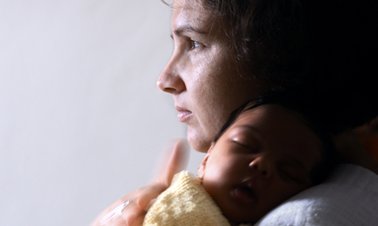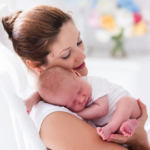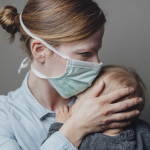A history of maternal psychiatric illness has been linked to postpartum depression (PPD), but this does not account for all instances of postpartum psychiatric illness. A recent study examined the impact of medical complications during pregnancy and/or childbirth on PPD and postpartum acute stress reactions (i.e., symptoms of post-traumatic stress disorder that last less than one month) in women with no history of perinatal or non-perinatal mood disorders.
Using the Danish Civil Registration System and the Danish Psychiatric Central Register, researchers analyzed a population-based data set of women born in Denmark in 1955 or later, without previous psychiatric illness. This population was restricted to first-time mothers with live singleton births between January 1, 1995 and June 30, 2012, yielding a total of 392,458 women who were followed for 12 months after the date of delivery. This study only examined women with a first episode of psychiatric illness occurring in the postpartum period, not during pregnancy. A total of 2,941 women were found to have a psychiatric disorder occurring during this time frame (0.8% prevalence).
The onset of any type of psychiatric illness was greatest during the first three months postpartum and the risk for developing psychiatric symptoms was highest during this time period. This was especially true for younger mothers (age <20) (incidence rate ratio [IRR] 1.36), as well as single and divorced/widowed mothers (IRR 1.12 and 1.42, respectively). In addition, pregnancy complications increased risk for psychiatric disorders, notably pre-eclampsia (IRR 1.29), gestational diabetes (IRR 1.28), hyperemesis gravidarum (HG; severe nausea and vomiting, IRR 2.02) and C-section (IRR 1.26).
Demographic predictors for PPD were similar to results for all psychiatric illness, but incidences of HG (IRR 2.69), gestational hypertension (IRR 1.84), pre-eclampsia (IRR 1.45) and C-section (IRR 1.32) were higher in this group. Factors during pregnancy that were linked to postpartum acute stress reaction include HG (IRR 1.93), preterm birth (IRR 1.51), gestational diabetes (IRR 1.42), C-section (IRR 1.36), fetal stress (IRR 1.25), and postpartum hemorrhage (IRR 1.23). No specific factors were linked to the risk of developing postpartum psychosis.
This study was limited in that outpatient psychiatric diagnoses came from specialist clinics, not primary care settings. This cohort therefore consists of women with symptoms debilitating enough to warrant psychiatric referral. It is likely that women with less severe symptoms were overlooked in this analysis. Of note, only 0.8% of the women in this study were identified as having a psychiatric disorder, which is much lower than the 10%-15% of PPD observed in other epidemiologic studies.
Nevertheless, the authors raise some interesting clinical applications. Delivery by C-section was associated with increased risk of both PPD and postpartum acute stress reaction (a 1.3- and 1.4-fold increase, respectively). The association with acute stress reaction may be due to the mother’s perception of the C-section itself: a planned procedure is likely to be less stressful than an emergency C-section. It is worth noting that emergency C-sections can be due to fetal stress, another risk factor for acute stress reaction.
Hyperemesis gravidarum (HG) was also associated with PPD and acute stress reaction. HG led to a 2.7-fold increased risk of PPD, as well as a twofold increased risk of acute stress reaction, indicating that unremitting nausea and vomiting requiring medical attention is particularly stressful to pregnant women and that its effects extend beyond the first trimester.
This study illustrates the importance of identifying difficult pregnancies and deliveries as risk factors for postpartum psychiatric illnesses. Several risk factors, such as HG and hypertension occur early in pregnancy; thus,, providers could identify these women for extra psychiatric support during pregnancy, and closer monitoring postpartum. In addition, providers may want to refer women who have had complications at the time of delivery for psychiatric follow-up and support. These interventions could potentially reduce the risk of postpartum psychiatric illness or may allow women with postpartum illness to be identified earlier.
Elizabeth Clayton, BA
Meltzer-Brody, S., Maegbaek, M. L., Medland, S. E., Miller, W. C., Sullivan, P., & Munk-Olsen, T. (2017). Obstetrical, pregnancy and socio-economic predictors for new-onset severe postpartum psychiatric disorders in primiparous women. Psychological Medicine, 47(8), 1427–1441. http://doi.org/10.1017/S0033291716003020








Leave A Comment